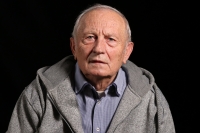My grandma wrote down the names of the villages that had been moved out to her notebook and expected when our turn would come
Download image
Miroslav Picek was born on 28 July 1941 in Benešov near Prague. He was supposed to spend his childhood in his grandparents´ mill in the settlement of Nedvězí but the family was ordered to move out less than a year after his birth. By the order of the Reich Protector Reinhard Heydrich the surroundings of the town of Neveklov, which included the settlement of Nedvězí, became part of a military training area for SS weapons and at the same time it was the first place where the German Nazis attempted to gradually Germanise the Czech nation. They got an alternative accommodation in a former poultry farm which belonged to a large farm Záhoří in Slapy. Witness´s father František Picek was a teacher and also an officer in the Czechoslovak army and during WWII he participated in actions of a local resistance group. Miroslav Picek remembers many events connected to the war, either by means of his father´s memories or he remembers some events himself. His father was called to serve in the army in 1947 and he was shortly imprisoned in “Domeček” in Hradčany for disobedience of the order at the beginning of the 1950s. During the period of the purges in the army, he was ordered by the then Deputy Minister of Defence Bedřich Reicin to write reports on his subordinates which concerned dozens of officers and non-commissioned officers. He was released probably on the condition of working with the authorities of the Ministry of the Interior which he supposedly refused and voluntarily left the army. His uncle Miroslav Picek, who was labelled as a kulak, was also imprisoned at that time in connection with collectivization of agriculture. Miroslav graduated from Mining Secondary School and in 1959 started to work, initially manually, in the uranium mines in Příbram. He later worked as a technician and he stayed working in the mines until 1974. He later moved to Prague and he worked as a site construction manager until his retirement. He and his wife raised four children, he now lives in Zbraslav.
